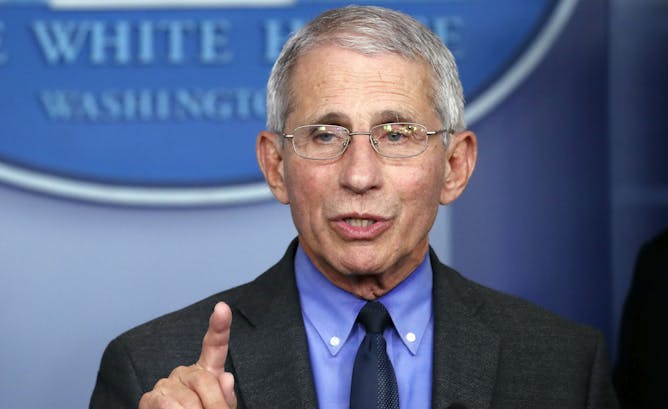
Dr. Anthony Fauci, head of the NIAID, said that a vaccination could be available as early as January, 2021.
AP Photo/Alex Brandon/File
Kristin Lunz Trujillo, University of Minnesota; Matt Motta, Oklahoma State University
As most of the world awaits a vaccine for COVID-19, a smaller group of people scoffs. They could spell real trouble in the effort to build widespread immunity.
|
Arts + Culture
|
-
Zachary Jaggers, University of Oregon
There's a disconnect between how many low-wage workers are being described, and what they're experiencing on the ground.
|
|
Economy + Business
|
-
Bruce Y. Lee, City University of New York
Reopening state economies too soon risks a second wave of the pandemic, and a surge in medical costs. Anyone who pays insurance premiums and taxes will be picking up the tab.
-
Elizabeth C. Tippett, University of Oregon
Conducting interviews over Zoom from your own home can add extra anxiety to an already-stressful act.
|
|
Education
|
-
Lisa Huisman Koops, Case Western Reserve University
From livening up household chores to connecting kids with relatives who are far away, music can a play a vital role.
|
|
Science + Technology
|
-
Vivian Zayas, Cornell University
Human psychology has evolved to avoid situations that could lead to infection. Behavioral choices now could have long-term effects on how people interact with others and the world.
-
Salvatore Rappoccio, University at Buffalo, The State University of New York
The movies make it seem like someday we'll be able to make people and objects grow really big or shrink really small. Whether this will be possible comes down to the smallest of things.
|
|
Politics + Society
|
-
Jonathan D. Fitzgerald, Regis College
Leaders who exude empathy in the midst of the COVID-19 crisis are experiencing surges in popularity. President Donald Trump's apparent lack of empathy is becoming a campaign issue.
|
|
Environment + Energy
|
-
H. Christopher Frey, North Carolina State University
After a five-year review, the EPA is leaving US standards for fine particle air pollution unchanged, even though recent studies suggest that tightening them could save thousands of lives yearly.
|
|
Most read on site
|
-
Nevan Krogan, University of California, San Francisco
Researchers at the University of California, San Francisco, identified nine existing drugs that show promise to treat COVID-19. The proteins they target haven't been tried before.
-
William Petri, University of Virginia
Your body can be infected and fight off SARS-CoV-2 without your ever noticing.
-
Johannes Becker, Boston University; David Starobinski, Boston University
Bluetooth wireless communication makes it possible for people to get alerts on their phones when they've been exposed to the coronavirus. Adding the right cryptography scheme keeps those alerts private.
|
|